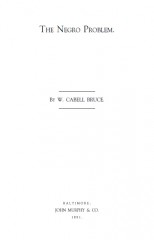
Author : Bruce William Cabell
Title : The Negro Problem
Year : 1891
Link download : Bruce_William_Cabell_-_The_Negro_Problem.zip
From first to last it should be borne in mind that the Negro Problem is a race problem. It is true that the great mass of the Southern negroes vote republican ballots. This, however, is not because they have any definite convictions upon questions of public policy, nor yet, except to a limited extent, because it was the Republican party that conferred upon them freedom and the franchise, and that to-day affects to be their one champion and guardian. Their intellectual condition renders the first idea ludicrous. The second is largely shorn of its claims to consideration by the fact that enough negroes have resided at the North to fully enlighten their race at the South as to how far white Republicans in the former section are disposed to fraternize with the African in all the personal and business relations of life. When to correct information in this respect is added the begrudging spirit in which a few petty offices are awarded to the Southern negro as his part of the spoil of a presidential election, it is hard to see how the emotions excited in him by the Emancipation Proclamation, the post-bellum Amendments to the Federal Constitution and the present professions of the Republican party could be otherwise than considerably cooled. The Southern negro votes a republican ballot because it is the race prejudices of the Southern whites, which he heartily reciprocates, and not the race prejudices of the Northern whites, that bear directly upon his daily life, and because he knows that the Republican party is still numerously composed of partisans whose feelings towards the Southern whites are such that they would not hesitate to use even him as an agency for their degradation. If by some process of transposition all the Southern whites could be removed to the North, and all the Northern whites to the South, only a few years of race friction would suffice to foster a political antagonism between the latter and the negro, as marked as that which now exists between the former and him. The problem then is a race problem. Whatever gratitude the negro might feel for the political privileges, conferred upon him by the Republican party, he would be an even more highly organized individual than the white man, if he were capable of soothing the smart of the social and political proscription at the North, which excludes him from schools, hotels, places of amusement, positions of public trust and private employments other than menial, with memories of historical favors, of which he is as a rule so ignorant that, when the test was made at a recent banquet in a Northern city, it is said that not one of the negro waiters present was found to know who William Lloyd Garrison was. Side by side, or rather face to face at the South, there are two races, of all the members of the human family the most widely separated by salient and ineffaceable physical distinctions, and to all appearances by moral and intellectual distinctions equally as salient and ineffaceable. Let us contrast these races. And first as to the physical distinctions between them. Surely, never were such distinctions more acutely accentuated. It is hard to see how a person can remember the inveterate aversion, which has sprung from race peculiarities not so pronounced, such for instance as those that keep the Englishman and the East Indian or the American and the Mongolian sullenly apart, even when brought into the closest contiguity in point of space, and yet fail to recognize in the wooly hair, the receding forehead, the flat nose, the thick lips and the protruding jaw of the negro, not to speak of the paramount incompatibility of color, personal attributes exquisitely calculated to disgust prepossessions based upon their exact opposites. To this statement it will, of course, be replied that, if the only lines of separation between the negro and the white man are physical, such prepossessions are capricious merely and should not be countenanced by the enlightened spirit of to-day. And ten to one the reply will emanate from some Republican editor or politician who would have heaped the bitterest reproaches upon the South, if her representatives had not helped to arrest the tide of Mongolian emigration, that was creeping over the face of the Pacific coast, and was stayed only when the stern common sense of self preservation indignantly trampled under foot every appeal of false sentiment and false philosophy. But the argument begs the question. Man is a creature of prejudice as well as of reason, and no government is conducted in the spirit of true statesmanship that does not take deeply ingrained prejudice into account. Omission in this regard is chargeable with one half of the irritation that always follows when one community undertakes to do the thinking or the want of thinking of another. More and more the tendency in modern times, especially since the reign of the abstractions, that conspire to swell the warnings of the French Revolution, has been to regard Government as a practical science that should seek to accommodate itself not only to the virtues but the weaknesses of the human beings upon which it operates. As well might a tailor attempt to frame a coat without reference to the defects of the structure, for which it is intended, as a Legislature to frame laws without reference to the social predilections and antipathies of its constituents, however unjust or even whimsical some of these predilections or antipathies might appear to an outsider to be. But the lines of separation between the negro and the white man are far from being purely physical. Even if the personal characteristics, to which we have alluded, were wanting, his origin, his history, his present condition and moral and intellectual idiosyncrasies of his would still impart to his individuality an invidious relief. From the dawn of recorded time, from the period, when his captive form was delineated upon the commemorative walls of ancient Egypt, until the present day, he has been the slave of a will other than his own, or, when not the slave of a will other than his own, the slave of what is even worse—of his own unillumined and misguided will. Of all the teeming millions, that people the Dark Continent, not one of its innumerable tribes has ever succeeded in elevating itself to a level that even the more advanced of the Asiatic nations would call civilization. Indeed, so sunk in savagery and superstition is this vast continent that, without a perceptible shock to the conscience of the world, six or seven of the Great Powers of Europe have partitioned its entire surface between them with as little regard to the inclinations of the natives themselves as if the latter were so many rabbits in a warren. So too, when any portion of the African race has been enslaved by the Caucasian, and, through the harsh discipline of slavery, has been lifted to a higher than its aboriginal estate, it has never been endowed with self-control except to its discredit. These are hard words. They are written entirely without an intention to claim that the conclusions of the future can always be safely deduced from the premises of the past. Nevertheless, it cannot be denied that they are justified by the facts and should therefore be allowed their full force in shaping the spirit, in which the Negro Problem should be approached. Froude, certainly an intelligent observer, has just warned Great Britain, after a tour of her possessions in the West Indies, that a more liberal extension of political power to the blacks in those islands would probably terminate in as many fac-similes of Hayti. What this means we are at no loss to determine. Another highly intelligent Englishman, Sir Spenser St. John, who resided for years as British Minister at Port-au-Prince, had, a short while before, expressed in a singularly interesting book, Hayti, or the Black Republic, which should be in the hands of every public man in the United States, his conviction that, in spite of her unsurpassed natural resources, in spite of the ready-made industrial, political and ecclesiastical organizations, to which she fell heir, when the French were expelled from the island, in spite of her long term of self-rule, Hayti, already the seat of chronic peculation and carnage, was steadily returning to serpent worship and cannibalism. The same view of Hayti was presented by the various correspondents of our great American dailies, who wrote from the island during the periodic revolution of last year. It is also sustained by the testimony of an official successor of Sir Spenser St. John. Other examples can be readily adduced. A negro, Charles H. I. Taylor, appointed Minister to Liberia by President Cleveland, threw up his mission in disgust, and came home to declare in a paper, which appeared in the Kansas City Times on April 22, 1888, that the Republic, founded and upheld by the generous patronage of our country, had arrived at the lowest point of disorganization and decay. It is well known that Congress was compelled to withdraw the privilege of self-government from the District of Columbia, as England had been compelled to withdraw it from Jamaica, because of the degree to which its value was impaired by the associated evils of negro suffrage. Contrasted, however, with the fate, that befell the Southern States, after the close of the Civil War, these illustrations assume but a secondary significance. As long as they retain the recollection of anything, the people of those States will not forget the odious and maddening crisis in their affairs when the liberated slave, the scalawag and the cast-off vagabond of other communities joined hands for the purpose of insulting and despoiling them, and their offices became instruments of plunder far more efficacious than the sword itself had been, and unblushing knavery and corruption culminated in tax rates high enough to be little less than the equivalents of confiscation and yet not high enough to save the public credit from utter shame, and the high places of justice were befouled, and parliaments, once the seats of eloquence and deliberative wisdom, resounded with the rude gibberish of a council fire in the bush, and ancient and illustrious commonwealths trod the lowest abysses of humiliation and disgrace. ...

Demolins Edmond - Saint Louis
Auteur : Demolins Edmond Ouvrage : Saint Louis Année : 19881 Lien de téléchargement :...














